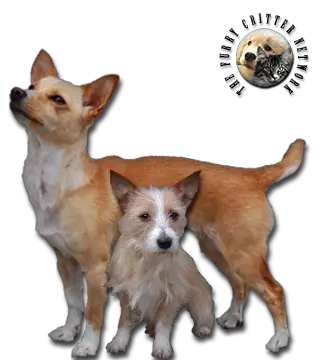Breed Standard
Head: Shape of the head is like that of a four-sided pyramid, with a broad base and pointed tip. Flat skull. Stop not pronounced. Straight nose bridge. Thin nose. Tight, fine lips.
Ears: Broad at the base, triangular, thin leather. Held perfectly erect or tilting slightly forward.
Eyes: Small, set obliquely in the skull. Honey or chestnut color.
Body: Long. Strong, long neck without dewlap. Narrow forechest. Chest is well let down. Ribs are rather flat. Broad, muscular loin. Long, straight back. Broad, muscular, very slightly sloped croup.
Tail: Strong, thick, pointed. Moderate length. Carried horizontal and slightly arched when in action.
Hair: Two varieties: short, smooth, and dense; or long and hard. Moderately coarse. The Small Portuguese Hound has the shortest coat.
Coat: Predominant colors: yellow and fawn with lighter and darker shades and a black tint. Solid color or pied.
Size: Large Hound: 55 to 70 cm (21.7-27.6 in).- Medium Hound: 40 to 55 cm (15.7-21.7 in).- Small Hound: 20 to 30 cm (8-11 in).
Weight: Large Hound: 20 to 30 kg (44-66 lb).Medium Hound: 15 to 20 kg 33-44 lb).Small Hound: 4 to 5 kg8.8-11 lb).
History
The Portuguese Hound, descended from large-eared hounds, is very common in northern Portugal where it is used as a hunter and pet.
There are three varieties:
- The Portuguese Hound (Podengo grande), a very rare breed used for hunting large game.
- The Medium Portuguese Hound (Podengo medio), which hunts rabbit in packs or alone and looks very much like the Ibizan Hound
- The Small Portuguese Hound (Podengo pequeno), which hunts rabbit underground and looks much like the Chihuahua.
Behavior
This rustic, extremely lively dog is used for hunting, but also makes an excellent pet and loyal guard dog. Firm training is required.
The Portuguese Hound requires a lot of exercise and room to run. Daily brushing is required.
Function
Hunting Dog, Guard Dog, Pet.
Health
A very healthy breed. Because this breed has had relatively limited intervention by humans, it has a low incidence of known inherited defects or diseases. There is very little data available currently.






